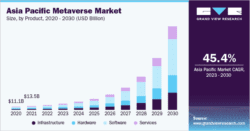Top 10 Ways Project Management Is Easier With Metaverse
The Metaverse represents a vision of a highly immersive, interconnected, and user-driven virtual reality space. It has the potential to transform how we live, work, and interact, but its development and implementation require careful attention to technological, social, and ethical considerations. The Metaverse has the potential to revolutionize project management by providing new tools and environments that enhance collaboration, communication, and productivity.
Here are some ways in which the Metaverse can be used for project management:
1. Virtual Collaboration Spaces: The Metaverse can offer virtual spaces where team members can meet, communicate, and collaborate on projects. These spaces can simulate physical meeting rooms or be entirely unique and imaginative. Users can join these spaces using avatars and have real-time interactions through voice, video, and text chat. They can share and annotate documents, brainstorm ideas, and track project progress together.
2. Immersive Project Visualization: The Metaverse enables the creation of highly immersive and interactive visualizations of project plans, timelines, and data. Instead of static charts and spreadsheets, project managers can use virtual reality (VR) and augmented reality (AR) to navigate through 3D representations of project structures, tasks, and dependencies. This can help in better understanding complex projects, identifying bottlenecks, and making data-driven decisions.
3. Simulated Project Environments: The Metaverse can provide simulated environments where project teams can test and iterate on designs, prototypes, and simulations. For example, architects can use virtual environments to walk through building designs, identifying potential issues before construction begins. Similarly, software developers can test user interfaces and interactions in virtual simulations. This allows for early detection of problems and reduces the need for costly rework.
4. Virtual Project Management Tools: Traditional project management tools can be integrated into the Metaverse to provide a seamless and immersive experience. These tools can include task management systems, project tracking dashboards, and resource allocation platforms. Project managers and team members can access and update project information within the virtual environment, enhancing collaboration and ensuring everyone is on the same page.
5. Training and Onboarding: The Metaverse can be used for project management training and onboarding processes. New team members can be introduced to project workflows, tools, and best practices through interactive virtual experiences. They can navigate virtual simulations that mimic real-world project scenarios and learn by doing. This immersive training approach can accelerate the learning curve and improve overall project team performance.
6. Global Collaboration: The Metaverse breaks down geographical barriers, allowing project teams from around the world to collaborate seamlessly. Time zone differences and physical distance become less of a hindrance as team members can connect virtually, eliminating the need for extensive travel. This opens up opportunities for diverse talent and expertise to be harnessed, leading to more innovative and efficient project outcomes.
7. Digital Asset Management: In the Metaverse, digital assets such as project files, documents, and design assets can be securely stored and shared. Blockchain technology can be leveraged to ensure data integrity, traceability, and ownership rights. This helps in maintaining a centralized repository of project-related information and enables easy access and sharing among team members, regardless of their physical location.
While the potential benefits of using the Metaverse for project management are significant, there are also challenges to consider. Ensuring data security and privacy, managing digital asset ownership, and addressing the learning curve associated with new technologies are important factors to address. Nonetheless, the Metaverse has the potential to enhance collaboration, visualization, and efficiency in project management, transforming the way teams work together to achieve project goals.
Also read: Top 10 Sectors Where Metaverse Disruption Was Major In Respect With Traditional Activities
Benefits of using Metaverse for project management
Using the Metaverse for project management offers several benefits that can enhance collaboration, communication, productivity, and overall project success. Here are some of the key advantages:
1. Enhanced Collaboration: The Metaverse provides a highly immersive and interactive environment for project teams to collaborate. It allows team members to connect and work together regardless of their physical locations. Virtual collaboration spaces within the Metaverse enable real-time communication, file sharing, and collaborative document editing. This fosters seamless collaboration and breaks down geographical barriers, enabling teams to work together more efficiently and effectively.
2. Improved Communication: In the Metaverse, project teams can communicate through voice, video, and text chat using avatars. This adds a personal touch to remote communication and helps build stronger connections among team members. The ability to have real-time conversations within virtual environments promotes clearer communication, reduces misunderstandings, and facilitates faster decision-making. It also allows for instant feedback and promotes a sense of presence and engagement.
3. Immersive Visualization: The Metaverse enables the creation of highly immersive and interactive visualizations of project plans, timelines, and data. Project managers can leverage virtual reality (VR) and augmented reality (AR) technologies to navigate through 3D representations of project structures, tasks, and dependencies. This enhances understanding, improves information retention, and enables stakeholders to grasp complex project concepts more easily. It also aids in identifying potential issues and risks, enabling proactive problem-solving.
4. Virtual Prototyping and Simulation: The Metaverse provides simulated environments where project teams can test and iterate on designs, prototypes, and simulations. This allows for the exploration of different scenarios and helps in identifying potential problems before implementation. For example, architects can use virtual environments to walk through building designs, and software developers can test user interfaces in virtual simulations. This minimizes rework, reduces costs, and improves the overall quality of project deliverables.
5. Global Accessibility: The Metaverse eliminates geographical constraints, enabling global collaboration on projects. Team members from different locations and time zones can connect virtually, eliminating the need for extensive travel. This opens up opportunities for accessing diverse talent and expertise, allowing organizations to build cross-functional teams with specialized skills. It also reduces costs associated with travel and accommodation, making projects more cost-effective and efficient.
6. Enhanced Project Tracking and Management: The Metaverse can integrate traditional project management tools into the virtual environment, providing a seamless experience for tracking and managing projects. Task management systems, project tracking dashboards, and resource allocation platforms can be accessed and updated within the Metaverse. This ensures that project information is centralized, up-to-date, and easily accessible to all team members. It also promotes transparency and accountability, enabling better project oversight and decision-making.
7. Training and Onboarding: The Metaverse offers immersive training and onboarding experiences for project teams. New members can navigate virtual simulations that replicate real-world project scenarios, allowing them to learn by doing. This accelerates the learning curve and ensures that new team members are quickly integrated into the project workflow. It also provides opportunities for ongoing training and skill development within the virtual environment.
8. Digital Asset Management: The Metaverse provides a secure and centralized platform for storing and sharing digital project assets. Files, documents, and design assets can be securely stored within the virtual environment. Blockchain technology can be leveraged to ensure data integrity, traceability, and ownership rights. This simplifies asset management, eliminates version control issues, and ensures that team members can access the latest project information at any time.
Leveraging the Metaverse for project management offers numerous benefits, including enhanced collaboration, improved communication, immersive visualization, global accessibility, streamlined project tracking, efficient training and onboarding, and effective digital asset management. These advantages can lead to increased productivity, faster project delivery, improved decision-making, and overall project success.
Also read: The Metaverse As A Tool For Personal Development: How Virtual Reality Is Changing The Way
Challenges of using Metaverse for project management
While the concept of using the Metaverse for project management holds great potential, there are several challenges that need to be considered and addressed. These challenges include:
1. Learning Curve: Adopting the Metaverse for project management requires individuals and teams to learn new technologies and tools. Familiarizing themselves with virtual reality (VR), augmented reality (AR), and other Metaverse platforms may pose a learning curve for some team members. Adequate training and support need to be provided to ensure smooth onboarding and adoption.
2. Technical Requirements: Utilizing the Metaverse often requires specific hardware and software infrastructure, such as VR headsets or high-performance computing systems. These technical requirements may limit accessibility for some team members or organizations, especially those with limited resources. Ensuring compatibility and addressing technical barriers can be a challenge.
3. Connectivity and Bandwidth: The Metaverse relies heavily on stable and high-speed internet connectivity. In regions or organizations with inadequate internet infrastructure, issues such as latency, dropped connections, and bandwidth limitations may hinder the seamless collaboration and real-time interactions required for effective project management within the Metaverse.
4. Security and Privacy: The Metaverse introduces new concerns related to security and privacy. As users interact within virtual environments, there is a need to safeguard sensitive project information, intellectual property, and personal data. Ensuring data encryption, secure access controls, and protection against cyber threats becomes crucial. Additionally, privacy concerns arise when capturing and storing user data, requiring robust privacy policies and consent mechanisms.
5. Standardization and Interoperability: The Metaverse is still in its early stages of development, and there is currently a lack of standardized protocols and platforms. This can lead to challenges in interoperability between different virtual environments, applications, and tools. Seamless integration and data exchange between various Metaverse platforms and project management systems may require significant effort and coordination.
6. Digital Ownership and Rights: Within the Metaverse, issues surrounding digital ownership and intellectual property rights can become complex. As projects generate digital assets and content, determining ownership, permissions, and usage rights for these assets needs to be carefully addressed. Blockchain technology can play a role in establishing transparent and secure ownership mechanisms, but implementing and enforcing these systems may require significant effort.
7. Social and Cultural Adaptation: The shift to a virtual environment for project management may challenge traditional working dynamics and team collaboration methods. Building trust, fostering team cohesion, and maintaining effective communication can be more challenging in a virtual setting. Overcoming social and cultural barriers to ensure effective teamwork and collaboration within the Metaverse is an ongoing process.
8. Ethical Considerations: As the Metaverse becomes more integrated into project management, ethical considerations arise. Issues related to data privacy, inclusivity, accessibility, and potential biases in virtual environments need to be carefully addressed. Ensuring fair and equitable participation, preventing discrimination, and promoting inclusive practices become crucial for ethical project management in the Metaverse.
While the Metaverse holds tremendous potential for project management, it is important to consider and address the challenges it presents. Overcoming the learning curve, addressing technical requirements, ensuring security and privacy, standardizing protocols, managing digital ownership, adapting to virtual collaboration dynamics, and addressing ethical considerations are key to harnessing the benefits of the Metaverse while mitigating its challenges.
Future of Metaverse for project management
The future of the Metaverse in project management holds significant potential for transforming the way teams collaborate, communicate, and execute projects. Here are some key aspects that highlight the future of the Metaverse in project management:
1. Enhanced Immersion: As technology advances, the immersive nature of the Metaverse will continue to improve. Virtual reality (VR) and augmented reality (AR) technologies will become more accessible and sophisticated, offering highly realistic and immersive project environments. Project teams will be able to interact with virtual objects and environments with a level of realism that closely resembles the physical world. This enhanced immersion will lead to more intuitive project visualization, improved communication, and better decision-making.
2. Seamless Integration: The future of the Metaverse lies in its seamless integration with existing project management tools and platforms. Project management software and Metaverse platforms will become more interconnected, enabling smooth data exchange and collaboration. This integration will allow project managers and team members to access project information, track progress, and communicate seamlessly within the virtual environment. It will bridge the gap between traditional project management practices and the immersive capabilities of the Metaverse.
3. Artificial Intelligence and Automation: The integration of artificial intelligence (AI) and automation within the Metaverse will revolutionize project management. AI algorithms will assist in analyzing project data, identifying patterns, and making predictions. Virtual assistants powered by AI will provide real-time project updates, automate routine tasks, and provide intelligent recommendations. This will enable project managers to make data-driven decisions, optimize resource allocation, and streamline project workflows.
4. Digital Twins and Simulations: Digital twins, which are digital replicas of physical assets or systems, will play a significant role in the future of the Metaverse for project management. Project teams will be able to create digital twins of project assets and environments, allowing for real-time monitoring and analysis. Simulations within the Metaverse will enable teams to test and optimize project designs, identify risks, and refine strategies before implementation. This will minimize costly errors and improve project outcomes.
5. Decentralization and Blockchain: Blockchain technology will play a crucial role in the future of the Metaverse for project management. Decentralized platforms and smart contracts will enable secure and transparent transactions, ensuring data integrity, digital asset ownership, and trust among project stakeholders. Blockchain-based systems will provide a distributed and immutable ledger for tracking project progress, documenting changes, and establishing accountability. This will enhance transparency, reduce disputes, and foster collaboration across project teams and organizations.
6. Virtual Workspaces and Remote Collaboration: The future of work is increasingly becoming remote, and the Metaverse will provide virtual workspaces for project teams to collaborate effectively from anywhere in the world. Virtual offices, meeting rooms, and collaboration spaces within the Metaverse will simulate the physical environment, fostering a sense of presence and engagement. This will enable seamless remote collaboration, cross-functional teamwork, and access to global talent, transcending geographical boundaries.
7. Gamification and Engagement: The future of the Metaverse in project management will incorporate gamification elements to enhance engagement and motivation. Project tasks and milestones can be transformed into interactive challenges, achievements, and rewards within the virtual environment. This gamified approach will promote a sense of progress, competition, and teamwork among project team members, leading to increased productivity and satisfaction.
8. Expanded Applications: While project management is an obvious application of the Metaverse, its potential goes beyond traditional project workflows. The Metaverse can be leveraged for virtual training, immersive simulations, virtual events, and experiential learning. Organizations can conduct virtual project management workshops, host virtual conferences, and create interactive training experiences within the Metaverse. This versatility will enable the Metaverse to serve as a holistic platform for project management and other collaborative activities.
In conclusion, the future of the Metaverse in project management holds immense possibilities. With enhanced immersion, seamless
integration, AI-driven automation, digital twins, blockchain, remote collaboration, gamification, and expanded applications, the Metaverse will redefine how projects are planned, executed, and managed. Embracing these advancements will enable organizations to achieve greater efficiency, productivity, and innovation in project management processes.
These projects represent a solution for decentralized governance of the crypto space (Metaverse / Web 3.0) on both a micro (corporate/project management)#Airdrop #Crypto #NFT
— CoinCodeCap Trading (@c3_trading) November 12, 2022
Top 10 ways Metaverse can help in Project management
The metaverse is a rapidly developing technology that has the potential to revolutionize many industries, including project management. Here are 10 ways that the metaverse can help project managers:
- Improved communication and collaboration: The metaverse can provide a more immersive and engaging environment for project team members to communicate and collaborate. This can lead to improved productivity and decision-making.
- Enhanced remote work: The metaverse can make remote work more feasible and productive. Project team members can collaborate in a shared virtual space, even if they are located in different parts of the world.
- Better training and onboarding: The metaverse can be used to provide more immersive and interactive training and onboarding experiences. This can help new employees learn the ropes more quickly and effectively.
- More realistic project simulations: The metaverse can be used to create more realistic project simulations. This can help project managers identify and mitigate risks, and make better decisions.
- Improved customer engagement: The metaverse can be used to improve customer engagement. For example, businesses can use the metaverse to create virtual showrooms or customer service centers.
- New product development: The metaverse can be used to accelerate new product development. Businesses can use the metaverse to create virtual prototypes and test new products with customers.
- Market research: The metaverse can be used to conduct market research. Businesses can use the metaverse to gather feedback from potential customers and get insights into their needs and wants.
- Brand awareness: The metaverse can be used to raise brand awareness. Businesses can use the metaverse to create interactive experiences that showcase their products and services.
- Sales and marketing: The metaverse can be used to boost sales and marketing efforts. Businesses can use the metaverse to create virtual stores and events, and to reach a wider audience.
- Education and training: The metaverse can be used to provide education and training. Businesses can use the metaverse to create virtual classrooms and training programs.
These are just a few of the ways that the metaverse can help project managers. As the metaverse continues to develop, we can expect to see even more innovative and creative ways to use this technology to improve project management.
Stay informed with daily updates from Blockchain Magazine on Google News. Click here to follow us and mark as favorite: [Blockchain Magazine on Google News].
Get Blockchain Insights In Inbox
Stay ahead of the curve with expert analysis and market updates.
latest from tech
Disclaimer: Any post shared by a third-party agency are sponsored and Blockchain Magazine has no views on any such posts. The views and opinions expressed in this post are those of the clients and do not necessarily reflect the official policy or position of Blockchain Magazine. The information provided in this post is for informational purposes only and should not be considered as financial, investment, or professional advice. Blockchain Magazine does not endorse or promote any specific products, services, or companies mentioned in this posts. Readers are encouraged to conduct their own research and consult with a qualified professional before making any financial decisions. The featured image used is just a creative depiction of the title and it does not intend to hurt sentiments of any person or institution. If it hurts anyone sentiments, please do not hesitate to reach out to Blockchain Magazine.

 Bitcoin
Bitcoin  Ethereum
Ethereum  XRP
XRP  Tether
Tether  Solana
Solana  USDC
USDC  Dogecoin
Dogecoin  Cardano
Cardano  Lido Staked Ether
Lido Staked Ether  TRON
TRON  Chainlink
Chainlink  Wrapped Bitcoin
Wrapped Bitcoin  Sui
Sui  Wrapped stETH
Wrapped stETH  Avalanche
Avalanche  Stellar
Stellar  Hedera
Hedera  Toncoin
Toncoin  Shiba Inu
Shiba Inu  LEO Token
LEO Token  Hyperliquid
Hyperliquid  Bitget Token
Bitget Token  Litecoin
Litecoin  WETH
WETH  USDS
USDS  Polkadot
Polkadot  Bitcoin Cash
Bitcoin Cash  Ethena USDe
Ethena USDe  MANTRA
MANTRA  Wrapped eETH
Wrapped eETH  Uniswap
Uniswap  Ondo
Ondo  Pepe
Pepe  Monero
Monero  Aave
Aave  NEAR Protocol
NEAR Protocol  WhiteBIT Coin
WhiteBIT Coin  Mantle
Mantle  Official Trump
Official Trump  Aptos
Aptos  Dai
Dai  Internet Computer
Internet Computer  Ethereum Classic
Ethereum Classic  Bittensor
Bittensor  Cronos
Cronos  OKB
OKB  POL (ex-MATIC)
POL (ex-MATIC)  Gate
Gate 









